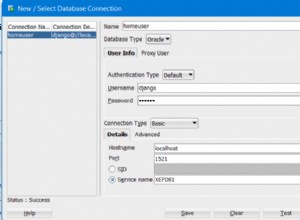Se você estiver usando o Sql Server 2008 ou superior, poderá usar algo chamado Table-Valued Parameter (TVP) em vez de serializar e desserializar seus dados de lista toda vez que desejar passá-los para um procedimento armazenado.
Vamos começar criando um esquema simples para servir como nosso playground:
CREATE DATABASE [TestbedDb]
GO
USE [TestbedDb]
GO
/* First, setup the sample program's account & credentials*/
CREATE LOGIN [testbedUser] WITH PASSWORD=N'µ×?
?S[°¿Q¥½q?_Ĭ¼Ð)3õļ%dv', DEFAULT_DATABASE=[master], DEFAULT_LANGUAGE=[us_english], CHECK_EXPIRATION=OFF, CHECK_POLICY=ON
GO
CREATE USER [testbedUser] FOR LOGIN [testbedUser] WITH DEFAULT_SCHEMA=[dbo]
GO
EXEC sp_addrolemember N'db_owner', N'testbedUser'
GO
/* Now setup the schema */
CREATE TABLE dbo.Table1 ( t1Id INT NOT NULL PRIMARY KEY );
GO
INSERT INTO dbo.Table1 (t1Id)
VALUES
(1),
(2),
(3),
(4),
(5),
(6),
(7),
(8),
(9),
(10);
GO
Com nosso esquema e dados de amostra prontos, agora estamos prontos para criar nosso procedimento armazenado de TVP:
CREATE TYPE T1Ids AS Table (
t1Id INT
);
GO
CREATE PROCEDURE dbo.FindMatchingRowsInTable1( @Table1Ids AS T1Ids READONLY )
AS
BEGIN
SET NOCOUNT ON;
SELECT Table1.t1Id FROM dbo.Table1 AS Table1
JOIN @Table1Ids AS paramTable1Ids ON Table1.t1Id = paramTable1Ids.t1Id;
END
GO
Com nosso esquema e API em vigor, podemos chamar o procedimento armazenado TVP de nosso programa da seguinte forma:
// Curry the TVP data
DataTable t1Ids = new DataTable( );
t1Ids.Columns.Add( "t1Id",
typeof( int ) );
int[] listOfIdsToFind = new[] {1, 5, 9};
foreach ( int id in listOfIdsToFind )
{
t1Ids.Rows.Add( id );
}
// Prepare the connection details
SqlConnection testbedConnection =
new SqlConnection(
@"Data Source=.\SQLExpress;Initial Catalog=TestbedDb;Persist Security Info=True;User ID=testbedUser;Password=letmein12;Connect Timeout=5" );
try
{
testbedConnection.Open( );
// Prepare a call to the stored procedure
SqlCommand findMatchingRowsInTable1 = new SqlCommand( "dbo.FindMatchingRowsInTable1",
testbedConnection );
findMatchingRowsInTable1.CommandType = CommandType.StoredProcedure;
// Curry up the TVP parameter
SqlParameter sqlParameter = new SqlParameter( "Table1Ids",
t1Ids );
findMatchingRowsInTable1.Parameters.Add( sqlParameter );
// Execute the stored procedure
SqlDataReader sqlDataReader = findMatchingRowsInTable1.ExecuteReader( );
while ( sqlDataReader.Read( ) )
{
Console.WriteLine( "Matching t1ID: {0}",
sqlDataReader[ "t1Id" ] );
}
}
catch ( Exception e )
{
Console.WriteLine( e.ToString( ) );
}
/* Output:
* Matching t1ID: 1
* Matching t1ID: 5
* Matching t1ID: 9
*/
Provavelmente há uma maneira menos dolorosa de fazer isso usando uma API mais abstrata, como o Entity Framework. No entanto, não tenho tempo para ver por mim mesmo neste momento.




